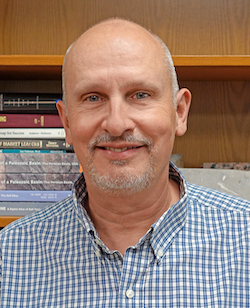Directorate

Lorena Moscardelli, Director
Lorena Moscardelli is the Director of the Bureau of Economic Geology and the State Geologist of Texas. She holds the Edwin Allday Endowed Chair in Subsurface Geology at the Jackson School of Geosciences. Lorena earned her Ph.D. in geology from The University of Texas at Austin and a degree in geological engineering from Central University of Venezuela. She previously worked for the Norwegian energy company Equinor in research, exploration, and field development and for the Venezuelan national oil company as an exploration geologist. Lorena co-chairs the executive council for the Kay Bailey Hutchison Energy Center and serves on the NCS2030 project's scientific advisory committee at the University of Stavanger. She is committed to direct geoscience research to serve society.
Contact: Executive Assistant to the Director, Maria Carlsen

Mark Shuster, Deputy Director
Mark Shuster is responsible for managing the Bureau's energy-related research. He joined the Bureau in September, 2016. Prior to joining the Bureau, Mark worked for Shell and affiliates for 30 years in upstream oil and gas roles around the world. Mark began his professional career as a Research Geologist working on projects on the Permian Basin, Atlantic margin basins and southeast Asia. Subsequently, Mark worked on exploration and appraisal projects in Venezuela, Australia, Middle East, Gulf of Mexico and most recently, Alaska. Mark received his Bachelor of Science degree in Geology from the University of the Pacific and his PhD in Geology from the University of Wyoming.

Jay Kipper, Deputy Director
As director of administrative functions at the Bureau, Jay Kipper manages personnel, fiscal reporting, budget management, and contract negotiation. Jay also supervises the Bureau's Core Research Centers, the Houston Research Center, the Geophysical Log Library, the Information Technology Group, and Administrative and Support Staffs. Jay was instrumental in the formation of the Advanced Energy Consortium to explore nanotechnologies for the energy industry, and he played a lead role in the FutureGen Texas clean energy initiative.

Seyyed Hosseini, Associate Director: Environmental Division
Dr. Seyyed A. Hosseini is Associate Director of the Environmental Division at the Bureau of Economic Geology, The University of Texas at Austin. He leads research programs in groundwater, carbon management, geothermal energy, induced seismicity, coastal studies, geologic hazards, mineral resources, and the water–energy nexus. A Research Professor with nearly 20 years of experience, he specializes in subsurface flow modeling, carbon sequestration, and applying machine learning to geoscience. Dr. Hosseini has managed major projects funded by federal agencies, industry, and international organizations, and has authored more than 100 peer-reviewed publications. He is also active in professional societies and advisory committees, with a vision focused on interdisciplinary innovation, sustainable resource management, and impactful science that serves Texas and beyond.

Mark Blount, Assistant Director: External Affairs
Responsible for creating and enhancing external relationships, Mark Blount works to promote the innovative and trusted energy, environmental and economics research of the Bureau of Economic Geology, and to attract new friends, partners and supporters. Roles include marketing and communication, media relations, outreach to the Texas Legislature, industry engagement, event support, land management, donor cultivation, and educational outreach. Mark has served The University of Texas at Austin since 1999 with previous roles as Assistant Dean for Development at the UT College of Education and Director of Corporate Relations for the University Development Office.

Dr. Scott Tinker, Director Emeritus
Dr. Scott W. Tinker has traveled to over 60 countries on his mission to bring industry, government, academia, and nongovernmental organizations together to address the dual challenge of energy access for human flourishing and environmental protection. Dr. Tinker wears many hats including speaker, educator, researcher, professor, filmmaker, author, TV and radio host, investor, board member, father and more.